实验6
tesk1-1.c
#include <stdio.h> #define N 4 int main() { int x[N] = {1, 9, 8, 4}; int i; int *p; for(i=0; i<N; ++i) printf("%d", x[i]); printf("\n"); // 方式1:通过数组名和下标遍历输出数组元素 for(p=x; p<x+N; ++p) printf("%d", *p); printf("\n"); // 方式2:通过指针变量遍历输出数组元素 (写法1) p = x; for(i=0; i<N; ++i) printf("%d", *(p+i)); printf("\n"); // 方式2:通过指针变量遍历输出数组元素(写法2) p = x; for(i=0; i<N; ++i) printf("%d", p[i]); printf("\n"); // 方式2:通过指针变量遍历输出数组元素(写法3) return 0; }
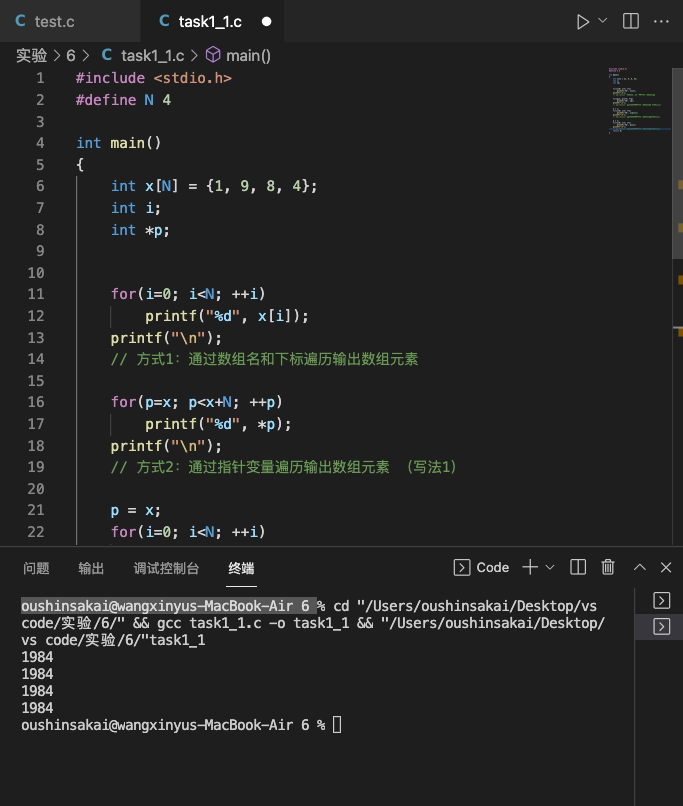
答:2004
tesk1-2.c
#include <stdio.h> #define N 4 int main() { char x[N] = {'1', '9', '8', '4'}; int i; char *p; for(i=0; i<N; ++i) printf("%c", x[i]); printf("\n"); for(p=x; p<x+N; ++p) printf("%c", *p); printf("\n"); p = x; for(i=0; i<N; ++i) printf("%c", *(p+i)); printf("\n"); p = x; for(i=0; i<N; ++i) printf("%c", p[i]); printf("\n"); return 0; }
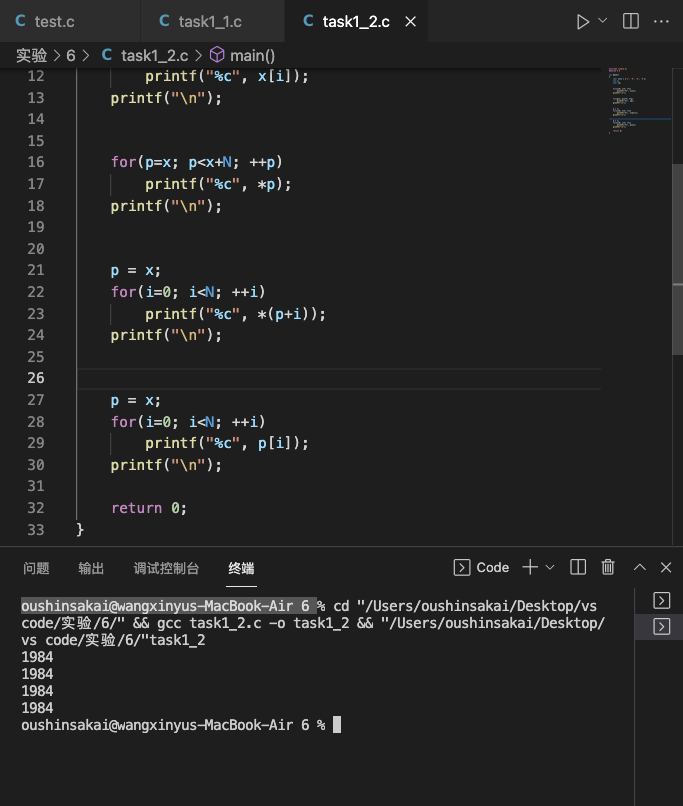
答;2001
tesk2-1.c
#include <stdio.h> int main() { int x[2][4] = { {1,9,8,4}, {2,0,2,2}} ; int i, j; int *p; int (*q)[4]; for(i=0; i<2; ++i) { for(j=0; j<4; ++j) printf("%d", x[i][j]); printf("\n"); } for(p = &x[0][0], i = 0; p < &x[0][0] + 8; ++p, ++i) { printf("%d", *p); if( (i+1)%4 == 0) printf("\n"); } for(q=x; q<x+2; ++q) { for(j=0; j<4; ++j) printf("%d", *(*q+j)); printf("\n"); } return 0; }
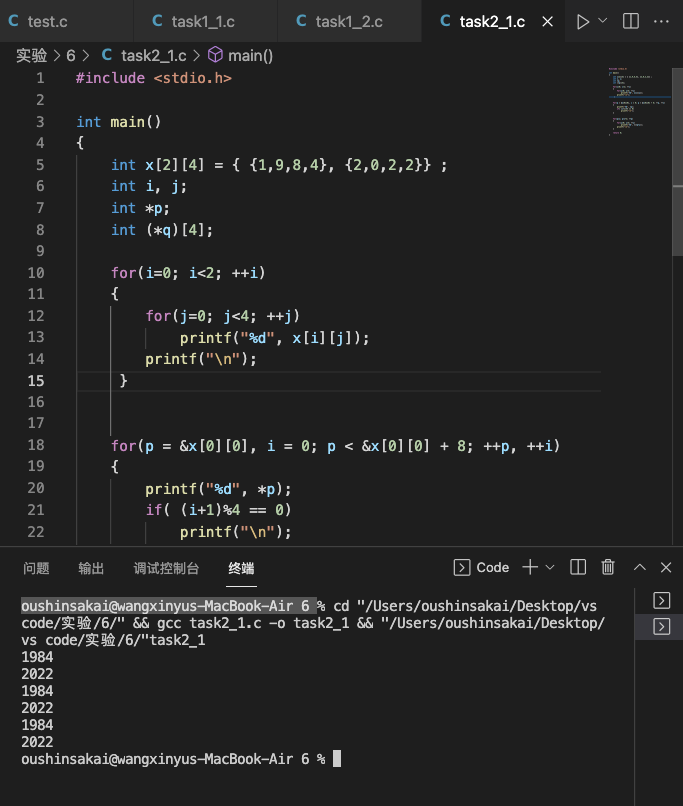
答:2004
2016
tesk2-2.c
#include <stdio.h> int main() { char x[2][4] = { {'1', '9', '8', '4'}, {'2', '0', '2', '2'} }; int i, j; char *p; char (*q)[4]; for(i=0; i<2; ++i) { for(j=0; j<4; ++j) printf("%c", x[i][j]); printf("\n"); } for(p = &x[0][0], i = 0; p < &x[0][0] + 8; ++p, ++i) { printf("%c", *p); if( (i+1)%4 == 0) printf("\n"); } for(q=x; q<x+2; ++q) { for(j=0; j<4; ++j) printf("%c", *(*q+j)); printf("\n"); } return 0; }
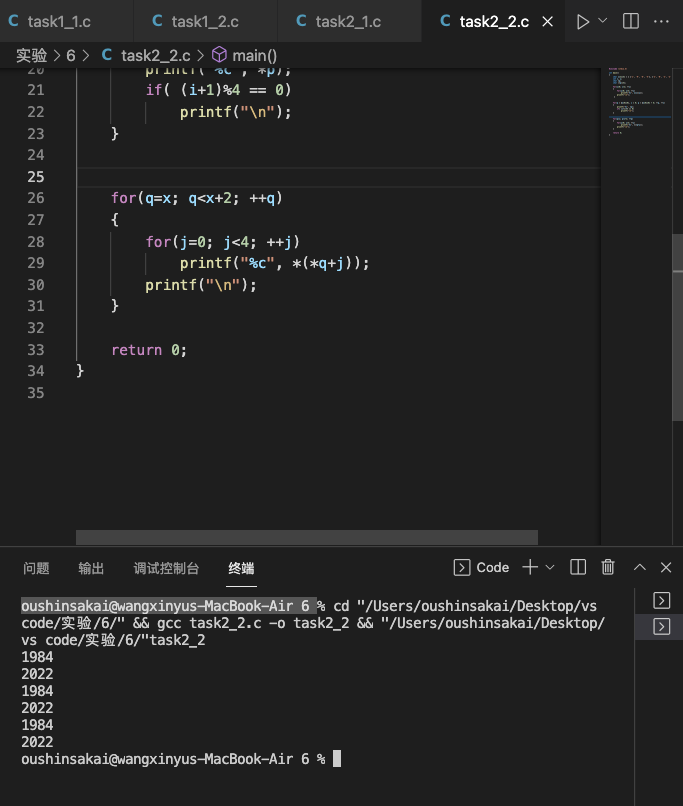
答:2001
2004
tesk3-1.c
#include <stdio.h> #include <string.h> #define N 80 int main() { char s1[] = "C, I love u."; char s2[] = "C, I hate u."; char tmp[N]; printf("sizeof(s1) vs. strlen(s1): \n"); printf("sizeof(s1) = %d\n", sizeof(s1)); printf("strlen(s1) = %d\n", strlen(s1)); printf("\nbefore swap: \n"); printf("s1: %s\n", s1); printf("s2: %s\n", s2); printf("\nswapping...\n"); strcpy(tmp, s1); strcpy(s1, s2); strcpy(s2, tmp); printf("\nafter swap: \n"); printf("s1: %s\n", s1); printf("s2: %s\n", s2); return 0; }
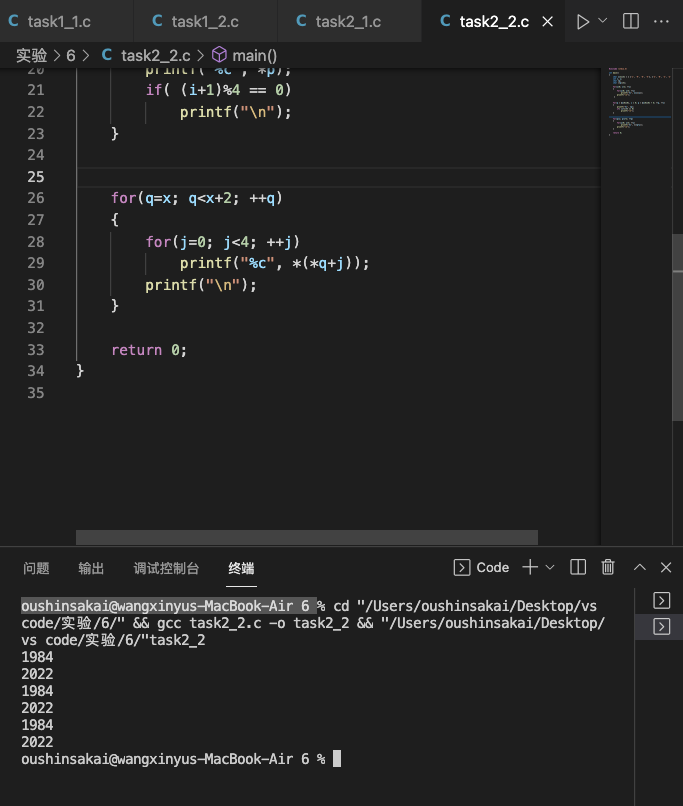
答:
strlen计算字符串中的字符个数,而sizeof计算的事对象所占的内存空间
13
不可以替换
交换了
tesk3-2.c
#include <stdio.h> #include <string.h> #define N 80 int main() { char *s1 = "C, I love u."; char *s2 = "C, I hate u."; char *tmp; printf("sizeof(s1) vs. strlen(s1): \n"); printf("sizeof(s1) = %d\n", sizeof(s1)); printf("strlen(s1) = %d\n", strlen(s1)); printf("\nbefore swap: \n"); printf("s1: %s\n", s1); printf("s2: %s\n", s2); printf("\nswapping...\n"); tmp = s1; s1 = s2; s2 = tmp; printf("\nafter swap: \n"); printf("s1: %s\n", s1); printf("s2: %s\n", s2); return 0; }
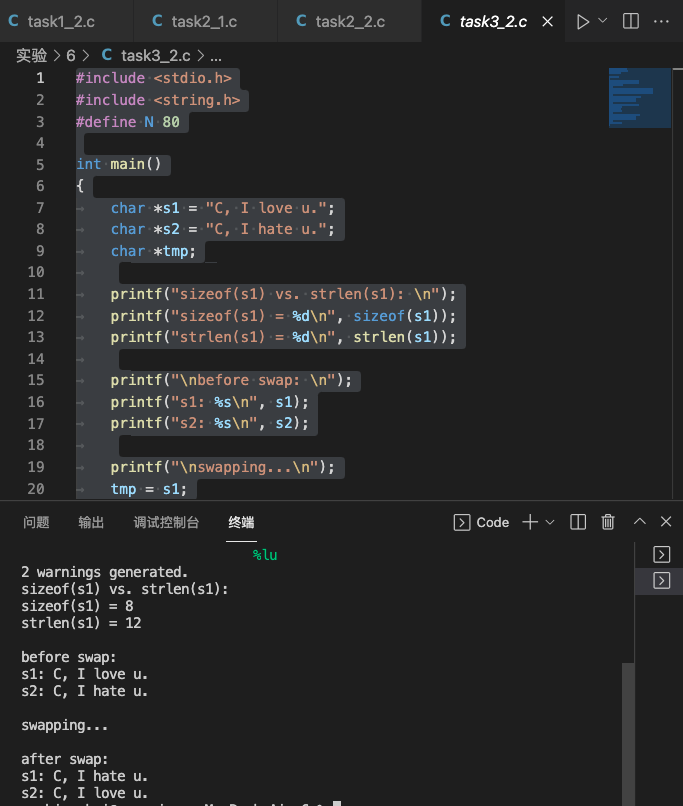
答:
存放的是"C, I love u."的地址,sizeof计算的是s1所占的内存空间,strlen计算的是字符串的字符个数
可以替换
交换的是地址,没有交换
tesk4.c
#include <stdio.h> #include <string.h> #define N 5 int check_id(char *str); int main() { char *pid[N] = {"31010120000721656X", "330106199609203301", "53010220051126571", "510104199211197977", "53010220051126133Y"}; int i; for(i=0; i<N; ++i) if( check_id(pid[i]) ) printf("%s\tTrue\n", pid[i]); else printf("%s\tFalse\n", pid[i]); return 0; } int check_id(char *str) { char *p,*temp; for(p=str;p<str+5;p++) { if(strlen(p) != 18) { return 0; break; } else { temp = p; for(;temp<p+18;temp++) { if(*temp>='0'&&*temp<='9'||*temp == 'X'); else { return 0; break; } } if(temp == p+18) return 1; } } }
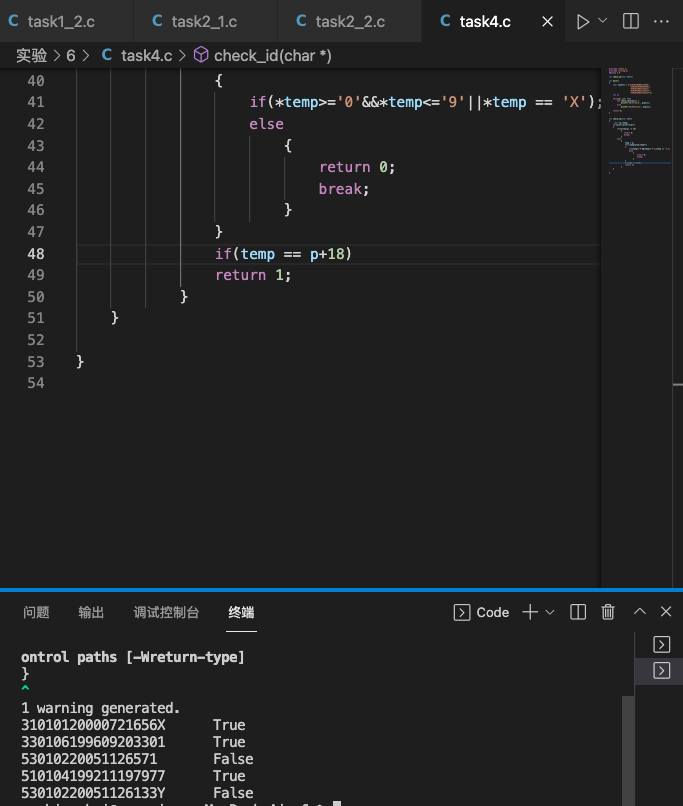
tesk5.c
1 #include <stdio.h> 2 #include <string.h> 3 4 #define N 80 5 int is_palindrome(char *s); 6 7 int main() 8 { 9 char str[N]; 10 int flag; 11 12 printf("Enter a string:\n"); 13 gets(str); 14 15 flag = is_palindrome(str); 16 17 if (flag) 18 printf("YES\n"); 19 else 20 printf("NO\n"); 21 22 return 0; 23 } 24 25 26 int is_palindrome(char *s) 27 { 28 int i=0,len,j; 29 len = strlen(s); 30 printf("字符串长度是: %d\n", len); 31 j = len/2; 32 for(;i<j;) 33 { 34 if(*(s+i) == *(s+len-i-1)) 35 i++; 36 else 37 { 38 return 0; 39 break; 40 } 41 if(i==j) 42 return 1; 43 } 44 }
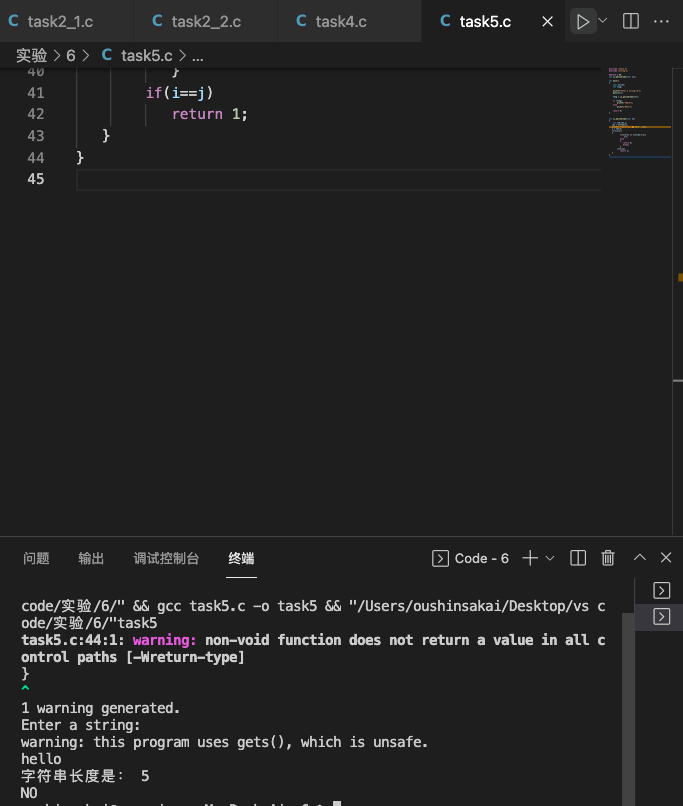
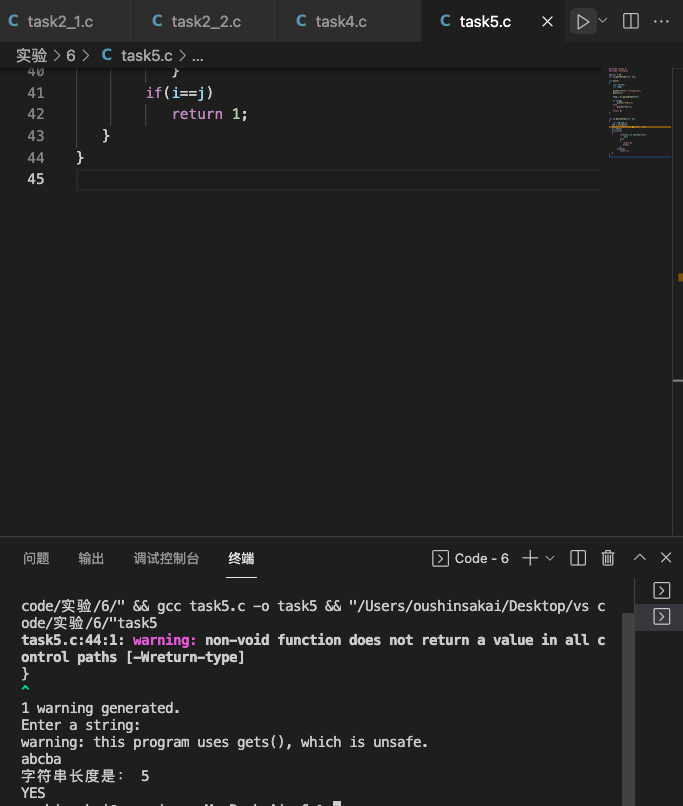
tesk6.c
#include <stdio.h> #define N 80 void encoder(char *s); // 函数声明 void decoder(char *s); // 函数声明 int main() { char words[N]; printf("输入英文文本: "); gets(words); printf("编码后的英文文本: "); encoder(words); // 函数调用 printf("%s\n", words); printf("对编码后的英文文本解码: "); decoder(words); // 函数调用 printf("%s\n", words); return 0; } /*函数定义 功能:对s指向的字符串进行编码处理 编码规则: 对于a~z或A~Z之间的字母字符,用其后的字符替换; 其中,z用a替换,Z用A替换 其它非字母字符,保持不变 */ void encoder(char *s) { for(;*s!='\0';s++) { if(*s == 'z'||*s == 'Z') *s = *s - 25; else if(*s >= 'a'&&*s < 'z'||*s >= 'A'&&*s < 'Z') *s = *s + 1; } } /*函数定义 功能:对s指向的字符串进行解码处理 解码规则: 对于a~z或A~Z之间的字母字符,用其前面的字符替换; 其中,a用z替换,A用Z替换 其它非字母字符,保持不变 */ void decoder(char *s) { for(;*s!='\0';s++) { if(*s == 'a'||*s == 'A') *s = *s + 25; else if(*s > 'a'&&*s <= 'z'||*s > 'A'&&*s <= 'Z') *s = *s - 1; } }
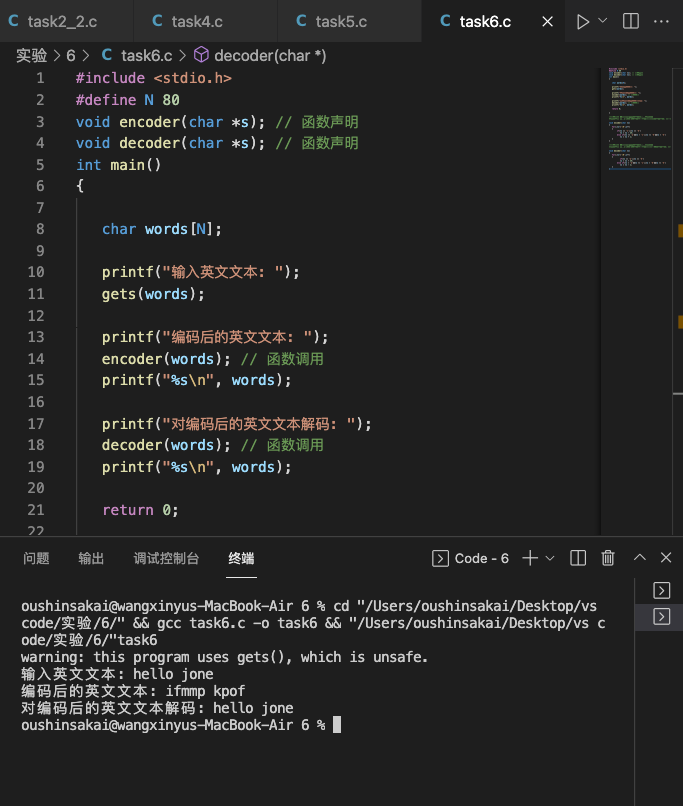



 浙公网安备 33010602011771号
浙公网安备 33010602011771号